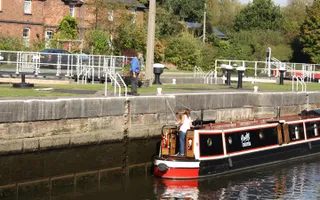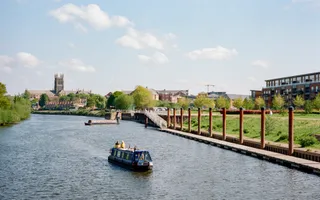Cruising on rivers
Rivers are generally wider than canals and have a flow on them, unlike canals. When you're taking a bend in a boat, keep this in mind and stick to the outside of the bend where the water flows faster, making the channel deeper.
Remember that when approaching locks, local trip boats and commercial traffic take priority. You might need to wait your turn.
When going through manned locks, always accept the instructions or advice from the lock keeper. If you have any queries about your route, don't be afraid to ask, and always give your intended destination.
If venturing onto the tidal sections of the rivers, speak to the lock keeper to find out what time you will have to leave to catch the tide right to lock through at your next destination. Get a Sissons Chart for the section you will need, as these will give you vital information for your navigation. Also, be aware of large commercial traffic on the river. They need the deepest course, so prepare to take avoiding action. Navigation lights are compulsory on all tidal sections.
Mooring on rivers
When mooring up to a pontoon, always try to moor up against the flow of the river, even if this means going past and turning around. This will give you more control and manoeuvrability to moor up safely.
Unlike canals, it is not advisable to moor alongside the riverbanks as there may be large boulders and rocks just under the water, or they may be just shallow mud.
If you moor to a non-floating pontoon, be aware that river levels can rise and fall overnight. Moor on long lines, especially if heavy rains have fallen in the previous few days, as it takes time for the rainwater to filter down.
Be prepared
Ensure that your craft is carrying a sufficient size anchor and length of chain (making sure it's attached to the boat) in case of emergencies, such as engine failures. This is especially important if you're navigating any tidal sections of the rivers.
It may sound daft, but make sure you have enough fuel for your journey. Refuelling facilities on rivers are few and far between, especially for petrol.
If possible, have a VHF radio on board. However, you should first obtain a ship's radio licence from OFCOM and pass the short-range operator course to get your certificate.
Always carry a life ring or horseshoe lifebuoy with a good length of line attached in case of a person overboard situation.
Ensure your crew is briefed on water safety before your trip.





